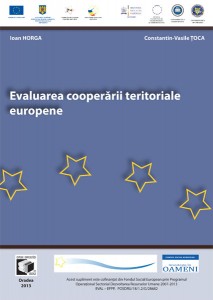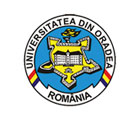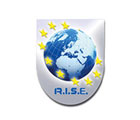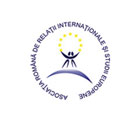The Evaluation of Cross-Border Cooperation in the EU
Secțiunea curentă: Membri
8 iunie 2015
Constantin-Vasile ȚOCA
 Asistent universitar dr. Constantin Vasile Ţoca, cadru didactic al departamentului de Relaţii Internaţionale şi Studii Europene al Universităţii din Oradea. Membru în cadrul Institutului de Studii Euroregionale şi al Asociaţiei Române de Relaţii Internaţionale şi Studii Europne. Din perspective gestionării fondurilor europene, euroregionale şi locale, în calitate de director de proiect la 4 proiecte printre care proietul Leonardo da Vinci, Dezvoltarea de competenţe în doemniul administraţiei publice, în partenriat cu universitatea din Debrecen, finanţat de Comisia Europeană prin programul Lifelong Learning Policy si proiectul “Să pregătim un viitor comun: Aglomeraţia Comunităţilor Debrecen – Oradea – 700.000 (2020)”, finaţat de Primăria Municipiului Oradea, plus 15 proiecte în calitate de membru în cadrul echipei de implementar, dintre acestea amintim Boosting Innovation through Capacity Building and Networting of Science Centre in the SEE Region.
Asistent universitar dr. Constantin Vasile Ţoca, cadru didactic al departamentului de Relaţii Internaţionale şi Studii Europene al Universităţii din Oradea. Membru în cadrul Institutului de Studii Euroregionale şi al Asociaţiei Române de Relaţii Internaţionale şi Studii Europne. Din perspective gestionării fondurilor europene, euroregionale şi locale, în calitate de director de proiect la 4 proiecte printre care proietul Leonardo da Vinci, Dezvoltarea de competenţe în doemniul administraţiei publice, în partenriat cu universitatea din Debrecen, finanţat de Comisia Europeană prin programul Lifelong Learning Policy si proiectul “Să pregătim un viitor comun: Aglomeraţia Comunităţilor Debrecen – Oradea – 700.000 (2020)”, finaţat de Primăria Municipiului Oradea, plus 15 proiecte în calitate de membru în cadrul echipei de implementar, dintre acestea amintim Boosting Innovation through Capacity Building and Networting of Science Centre in the SEE Region.
Membru în cadul coletivului de redacţie al revistei Eurolimes, Revista Română de Relaţii Internaţionale şi Studii Europene precum şi al Revistei Române de Studii de Securitate. Constribuţia ştiinţifică este cuantificată prin intermediul a peste 25 de articole prezentate la conferinţe internaţionale şi publicate în reviste sau volume indexate în baze de date internaţionale, plus 2 cărţi personale şi 3 volume coordonate.
Domeniul de interes ştiinţific precum şi aria de cercetare se îndreaptă în direcţia domeniilor: cooperării transfrontaliere, evaluarea programelor şi politicilor publice europene, organizaţii internaţionale, instituţii şi politici europne, comunicare şi negociere şi sociologia relaţiilor internaţionale.
Publicaţii relevante pentru proiect
 Constantin – Vasile Ţoca, Romanian-Hungarian cross-border cooperation at various Territorial levels, with a particular study of the Debrecen-Oradea Eurometropolis : (European grouping of territorial cooperation-EGTC), Editura Universităţii din Oradea, Oradea, 2013, ISBN 978-606-10-1160-5
Constantin – Vasile Ţoca, Romanian-Hungarian cross-border cooperation at various Territorial levels, with a particular study of the Debrecen-Oradea Eurometropolis : (European grouping of territorial cooperation-EGTC), Editura Universităţii din Oradea, Oradea, 2013, ISBN 978-606-10-1160-5
Abstract: Cross boder cooperation at the Romanian-Hungarian border after 1989 has see many shapes and forms depending on the evolution of European cooperation structures as, on the level of the communities from Debrecen (HU) and Oradea (RO) there are functional NUTS levels. Thus we can discuss about cooperation in different fields along the Romanian – Hungarian border.
Constantin – Vasile Ţoca, Evaluarea cooperării transfrontaliere la frontierele României-studiu introductiv, in Ioan Horga, Constantin – Vasile Ţoca, Florentina Chirodea, Evaluarea cooperării transfrontaliere la frontierele României, Editura Primus, Oradea, 2013, ISBN 978-606-8318-73-8
Cross border cooperation constitutes an essential dimention in each state, as shown by Romania’s example where there are two types of boders: internal and external EU borders, with interesting developments in the field of cross border cooperation with neighbouring countries.
 Ioan Horga, Constantin Vasile Ţoca, Evaluarea cooperării teritoriale europene, Editura Universităţii din Oradea, Oradea, 2013, ISBN 978-606-10-1168-1
Ioan Horga, Constantin Vasile Ţoca, Evaluarea cooperării teritoriale europene, Editura Universităţii din Oradea, Oradea, 2013, ISBN 978-606-10-1168-1
Abstract: European territorial cooperation is a new instrument design to give member states opportunities for new cooperation directions in common interest field that can lead to sustainable development and an increase in living standards for citizens of target countries. Alongside territorial cooperation, evaluation of the process can offer an enlarged view of cooperation and lead to ideas on how to improve it.
Constantin – Vasile Ţoca, Edina Lilla Meszaros, The existing EGTC models of territorial cohesion and their applicability in the Debrecen – Oradea Agglomeration, Editor Dr. Kozma Gabor, Department of Social Geography and Regional Development Planning, University of Debrecen, HU ISSN 2062-8870 (Print), HU ISSN 2062-8889 (Online), p.23.40
2012
Good practice examples offered by the new European structures based on the EGTC instrument represent solutions that are both viable and applicable. The existance of a sustained collaboration at the Romanian – Hungarian border, between the cities of Oradea and Debrecen, can become the first EGTC cooperation in this area, taking advantage of functional EGTC structures that offer valuable information as good practice examples.
Constantin-Vasile Ţoca, Adrian-Claudiu Popoviciu, The European Grouping of Territorial Cooperation (EGTC), Instrument of Cross-border Cooperation. Case Study Romania – Hungary, în revista Eurolimes, Book 10, Autumn 2010, Oradea University Press, ISSN: 1841 – 9259, p. 66-75
Abstract: The evolution of cooperation at the European borders has had an impact on the border between Romania and Hungary. After the fall of communism, cross border cooperation between Romania and Hungary has developed through European funds; cooperation between the cities of Oradea and Debrecen has presented great potential in common interest fields through the use of the new EGTC instrument.
Constantin Ţoca, Comparative SWOT analysis of the Debrecen – Oradea cross – border communities, în Media and European Diversty, edit. L. Şoproni, I. Horga, Ed. Bruylant, Bruxelles, 2010, ISBN 978-2-8027-3090-3, p. 203-209
Abstract: The SWOT analysis on cross border communities from Debrecen (Hungary) and Oradea (Romania) presents a large aray of indicators and 6 relevant dimensions of common strategic interest for the communities in Oradea and Debrecen that permit new forms of cooperation based on new European instruments for common and sustained development.







